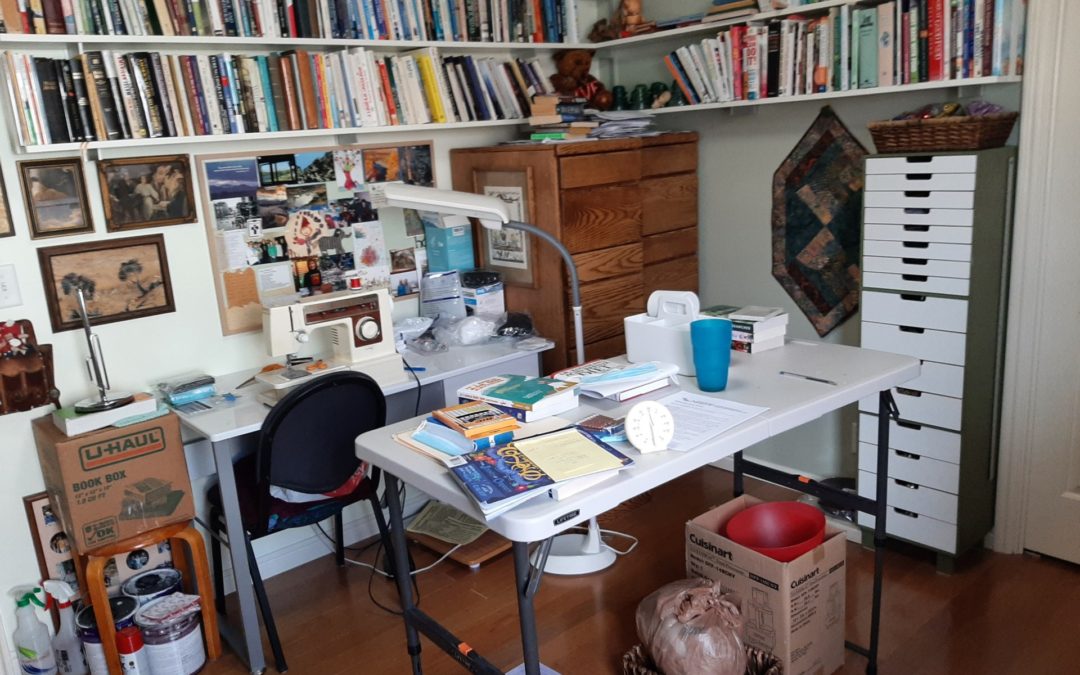Why do today what you can put off till tomorrow? A clear desk is the sign of a sick mind. A stitch in time saves nine. Research has shown that order in our surroundings reduces anxiety. You should be more responsible!
Full disclosure, this is a picture of my craft room/office today! The balance between my Critical and Indulgent Parents and my Wise Parent teeters on the edge when I get too involved in a project like completely revising my website. The stack of unfiled papers seems innocent until I can’t find a document I must have. The flurry of sticky notes, small tablets of ideas to consider and unfinished posts requires me to shuffle through them as I work. My hard copy files are mostly in chaos and I have pieces of craft projects stuck all around the room. But I keep focusing on getting this done and then I’ll take some time to put it in order again. Fortunately I can escape to more orderly rooms as needed.
Procrastination offers lots of opportunity for humor and it’s good to laugh at yourself when you notice that you’ve yet again sabotaged the quality of your efforts and your peace of mind. Belief # 9 states that it’s more comfortable to avoid than to face problems or responsibilities. When you realize how Belief #9 ignites fight-or-flight, you won’t be so amused. You’ll notice that the other Indulgent Parent beliefs depend on Belief # 9, and its power to encourage flight from problems you face. Your Adult should look for these other beliefs when your body signals that your Child’s anxiety has increased.
When you think of procrastination, you probably consider a project you resist doing or the time-crunch created because you put something off too long. But this toxic avoidance occurs far more widely than that. It happens whenever your Adult fails to manage your Child’s impulses to seek comfort right now. Without your Adult’s attention you may replace problem-solving behavior with activities that please your Child so much that you actually forget the reality you’re avoiding. These activities can become addictions which disable your Adult and allow neglect of your problems and responsibilities, sometimes for years. Claim Your Own Mental Fitness, Part II, Chapter 2 in my book offers insights about several addictions.
Because your fight-or-flight tendencies never disappear, your Adult must not take a vacation from managing them. The first step to prevent damaging avoidance is to recognize the influence of your Indulgent Parent quickly. Your Adult can observe that flight dominates when you first choose to avoid things; but then fight can take over if anyone tries to push your Child into facing your issues. Your Adult can’t take much time off, just like the baby-sitter for a three-year-old. People vary in how quickly their Child will get hooked on avoidant or just fun activities. But no one can trust a Child to cope with life on its own.
You can’t allow too much humor about this; keeping your Adult in charge is the key to mental fitness and the self-respect, self-confidence and relationship-satisfaction that it brings. In fact, your Wise Parent must reinforce Adult efforts to prevent your Child from luring you into too much indulgent behavior. Look up “procrastination” online to discover many wise people’s statements to build up your Wise Parent.
Gradually, your Wise Parent’s self-talk will overcome your Indulgent Parent’s influence and support your Adult as it reminds you that almost no problems are unbearable or life-threatening. They’re just boring, frustrating, annoying, embarrassing, unfair, inconvenient or temporarily overwhelming. No need for fight-or-flight, we’ve got this. It’s not more comfortable in the long run to avoid unpleasant realities. We’ve noted how Belief # 9 impedes the grief process when denial and anger prevent you from facing your sadness. It’s only a temporary solution promoted by your Indulgent Parent. Using the FORMULA, your Adult and Wise Parent together can gradually reassure your Child to the point that your Adult won’t have to work so hard to stay on task.

